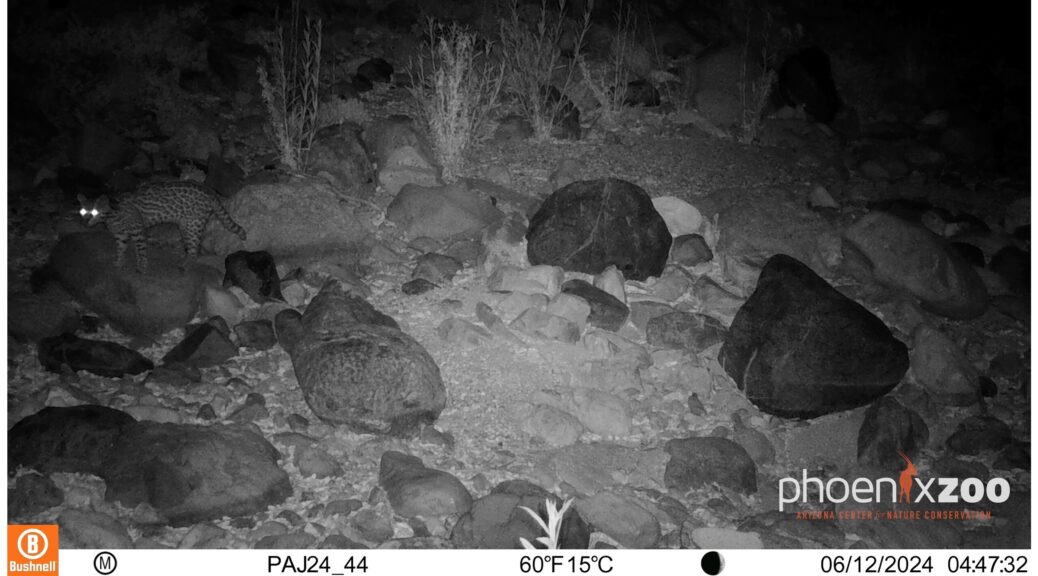Ocelots have been listed as endangered in the United States since 1972 and are only intermittently recorded in Arizona. This cat was observed in desert scrub and at lower elevation than most historical records of ocelots in Arizona. One other ocelot has been recorded consistently in the last year on camera footage from the Huachuca mountain range, greater than 50 miles away from this new sighting.
The Atascosa Highlands, which includes the Atascosa, Tumacácori, and Pajarito mountains, is a known wildlife corridor, but is relatively understudied, particularly compared to other wildlife corridors in southeastern Arizona. The Zoo’s Field Conservation Research team conducted a pilot study in 2023 using 30 field cameras, which recorded 21 species of mammals, but no ocelots or jaguars. The number and diversity of species recorded during the pilot study spurred the Zoo team to expand the study in 2024. The new ocelot video was found during planned maintenance of the camera array in July.
“Finding evidence of a new ocelot in southern Arizona reinforces our commitment to collaborative efforts to conserve wildlife and their habitats in the region,” says ACNC/Phoenix Zoo President and CEO Bert Castro. “We’re eager to review additional camera data from this study to see what else we can learn about species of conservation concern in the borderlands and what they need for their continued survival.”
Zoo staff and volunteers will return to the field in August to retrieve additional camera data from the spring and summer seasons, and again in October to gather records of wildlife movement in the study area in the fall. Their aim is to have the cameras in place for a full 18 months to allow for analyses of seasonal differences and other factors. They also plan to collect environmental DNA samples from area waterways that will help provide a richer understanding of mammal ecology in this understudied corridor. They are hopeful that they will find more records of this new ocelot and other significant sightings as data analysis continues.
Broll/footage: https://www.dropbox.com/scl/fo/ltanoe0wiv72jsg6nu5r9/AN_cmC8W9HfkhJ2l8oE1UII?rlkey=idud39e3xms41s6dl1gavj4nl&st=dv01d0bn&dl=0
Credit: Phoenix Zoo
About the Arizona Center for Nature Conservation
The Arizona Center for Nature Conservation operates the Phoenix Zoo. The ACNC advances the stewardship and conservation of animals and their habitats while providing experiences that inspire people and motivate them to care for the natural world.
The Phoenix Zoo is the only zoo in the Valley accredited by the Association of Zoos and Aquariums and is a non-profit zoological park, serving 1.4 million guests annually. The Zoo is home to more than 3,000 animals, many of which are endangered and threatened species. For information on upcoming events, exhibits and activities at the Phoenix Zoo, visit www.phoenixzoo.org.
Media Contact
Linda Hardwick, Phoenix Zoo, 1 6026633254, [email protected]
SOURCE Phoenix Zoo


